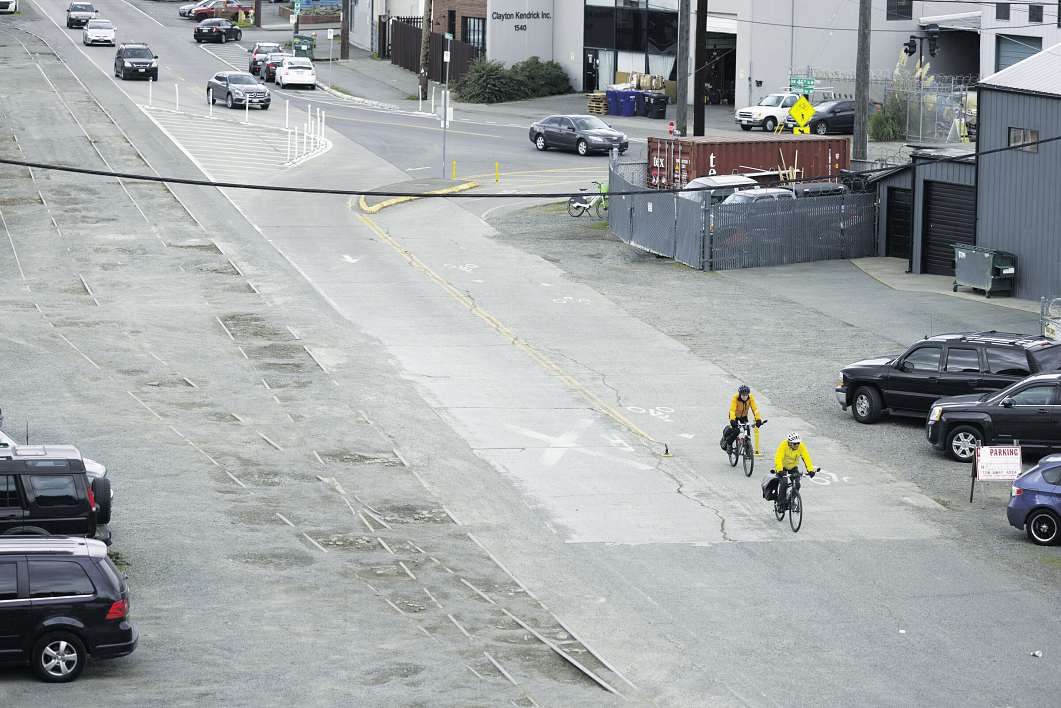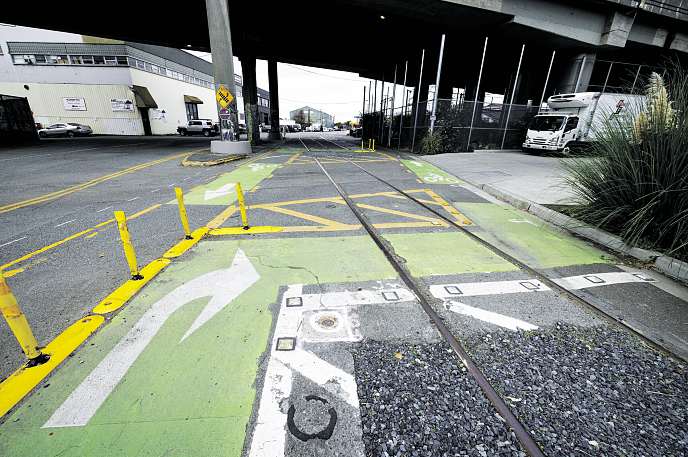
Railway tracks are seen to the west of the Ballard Bridge along what is considered the “missing link” of the Burke-Gilman Trail on Tuesday in Seattle’s Ballard neighborhood.
TRAFFIC LAB
The Seattle City Council approved a transfer agreement with a local rail company Tuesday, clearing the way to pave over a set of tracks in Ballard that have long been the source of injury to cyclists traversing the Burke-Gilman Trail’s “missing link.” The 8-0 vote likely concludes a decades long fight over the small section of trail, one bogged down in process, insurance policies and complicated agreements between the city and rail companies.
Failure to find a solution to this danger-spot at 45th Avenue Northwest, just east of the Ballard Bridge, has led to numerous lawsuits and life-altering injuries, including to Doug Kelbaugh, chair of the department of architecture at the University of Washington, who suffered a traumatic brain injury in 2022. He died earlier this year.
The city has attempted several safety upgrades — including adding gravel in an effort to force cyclists to cross the tracks at a 90-degree angle — that have largely failed to solve the problem. By one estimate, emergency vehicles responded to crashes there 39 times between 2015 and 2020, with likely many more crashes going unreported.
“This is an opportunity to make one of the most dangerous railroad crossings in our city safe,” said Councilmember Dan Strauss, whose district includes Ballard, and who helped broker the agreement. “One of the first bike rides I took on the streets without my training wheels was at this location, and I watched somebody crash and have to be taken to the hospital.”
The paving could be completed as early as this week, according to Mariam Ali, spokesperson for the Seattle Department of Transportation, as the city of Seattle races against two deadlines. One is the weather: Crews want to lay down concrete before winter fully settles in. The other is legal: A 2022 settlement agreement with cyclists who had been injured at this location requires the city to make meaningful safety improvements by Jan. 1.
Bob Anderton, one of the lawyers whose clients’ cases led to the settlement, said paving the section would be a “huge improvement” and, if done correctly, would satisfy his clients that the agreement had been fulfilled.
“It’s not just that they wanted to get compensated for the harm that they endured,” he said of his clients.
“They wanted to not have other people get hurt there.”
Tuesday’s vote is the result of a twisting process that ended in a compromise between the city of Seattle and Ballard Terminal Railroad, which has controlled the tracks in question since 1997.
The tracks, which run from Shilshole Bay, along the ship canal and underneath the Ballard Bridge, make up a short-line railroad — an offshoot from the main tracks running north and south where the companies can stage and load cars.
Seattle granted a 30-year operating agreement to Ballard Terminal Railroad in 1997, meaning it was due to expire in four years. One condition of the agreement was that Seattle not be liable for any claims resulting from the tracks.
Fast forward to today and the legal liability of those tracks has added up. In just the last two years, Anderton has brought two separate cases on behalf of eight, then 10 people injured while riding their bicycles.
At the same time, Ballard Terminal Railroad is poised to lose insurance coverage for those tracks, said Josh Brower, attorney for the company. In a shrinking insurance market, finding a replacement is unlikely.
That scenario of losing insurance, combined with the pressure on the city to comply with its settlement agreement, spurred momentum toward paving the tracks.
To solve its insurance question, Ballard Terminal Railroad will transfer ownership of the tracks to a different entity with shared owners, Meeker Southern Railroad.
In exchange for amending the 1997 operating agreement, Strauss pushed for paving the tracks.
It’s an agreement that’s left all parties pleased.
“We think it’s a great compromise,” Brower said. “It’s really the hope of a new day, a new chapter.”
The tracks could still be used for their intended purpose, even with the added pavement, Brower added.
Lee Lambert, executive director of the Cascade Bicycle Club, celebrated the vote to pave over “the hazardous and dis-used railroad tracks that have caused countless crashes and injuries over the past two decades.
This is a step forward in making this short section of the Missing Link safer.”
In a statement, Ali of SDOT said the agreement is “possible because Ballard Terminal Railroad and its successor, Meeker Southern Railroad, indicated earlier this year that they do not intend to operate trains over this portion of the track.”
The “missing link” quandary is far from finished. An agreement to pave the tracks doesn’t have any direct bearing on the larger question of where to build a 1.4-mile Burke-Gilman connection through Ballard. The preferred option for advocacy groups and the city has been along Shilshole.
“Shilshole Avenue is a failed street that is dangerous for people on bikes, and it’s bad for people driving as well due to the lack of a separated bike lane,” Lambert said.
Industry groups have fought the proposal over concerns about bike traffic running so close to their gates.
The legal current has gone against the city, making imminent construction on a Shilshole path unlikely.
As a result, Strauss earlier this year proposed a route along Leary Way that would transform the wide road into one with a 12-foot running and biking trail, a 10-foot sidewalk, and car lanes, with buffers in between.
The city expects to reach 30% design on the Leary option by the end of the year, Strauss said.
The Leary option would n s w b e b o
not foreclose a path on Shilshole, which bike advocates would still like to see built, but it would serve as a nearer-term connection on what’s been a consistently dangerous route for riders.
David Kroman: 206-464-3196 or dkroman@seattletimes.com; on Twitter: @KromanDavid.
About the project
Traffic Lab is a Seattle Times project that digs into the region’s thorny transportation issues, spotlights promising approaches to easing gridlock, and helps readers find the best ways to get around. Traffic Lab receives financial support from Pemco Mutual Insurance Company. Seattle Times editors and reporters operate independently of our funders and maintain editorial control over Traffic Lab content.
